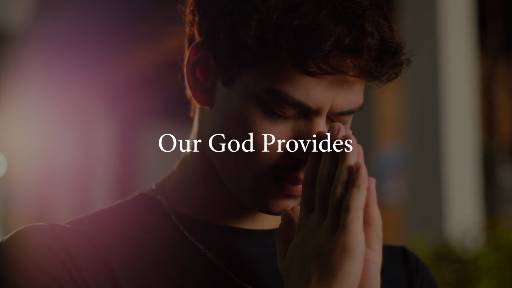-
Delivered, Guided, Provided Series
Contributed by D Marion Clark on Nov 28, 2017 (message contributor)
Summary: We are going to look at verses 12-16, which summarize God’s works. They provide a tidy three-point sermon about what God did for his people. He delivered them; he guided them; and he provided for them.
Psalm 78:12-16 Delivered, Guided, Provided
12/29/13 D. Marion Clark
Introduction
For the ninth year I have had the privilege of preaching the Sunday after Christmas. The first year, the Responsive Reading happen to fall on Psalm 78, and I thought it to be a fitting text to preach from. Since then, I have gone back to the same Psalm every year. Each time there seems to be one thing more that I learned.
The psalm basically is a rebuke to the people of God for forgetting his great wonders. The psalmist promises that he will pass on these glorious deeds to the next generation. So he recounts those wonders, as well as the failures of God’s people to obey God and to remember what he had done. We are going to look at verses 12-16, which summarize God’s works. They provide a tidy three-point sermon about what God did for his people. He delivered them; he guided them; and he provided for them.
Text
God Delivered
12 In the sight of their fathers he performed wonders
in the land of Egypt, in the fields of Zoan.
The wonders of God that take center stage in the history of Israel are those involving their exodus from Egypt. The exodus is the great story of deliverance. No wonders top those wonders; no deliverance is more significant than that deliverance. For though their history begins the story of Abraham, Isaac, and Jacob, it is this event that turns them into a nation; and not merely a nation, but the nation of God. Though God made a covenant with their fathers – Abraham, Isaac, and Jacob – it is when the exodus takes place that he makes a covenant directly with them to be their God and for them to be his people. Of all their deliverers, it is Moses who rises supreme because he was the redeemer whom God sent to deliver his people.
“In the fields of Zoan,” refers most likely to the place where Pharaoh held court when Moses met with him and pronounced each plague. So Moses pronounces each of the ten wonders. Verse 13 takes us to the climactic wonder – the crossing of the Red Sea.
13 He divided the sea and let them pass through it,
and made the waters stand like a heap.
The crossing of the Red Sea is the climactic moment of deliverance from slavery. As Moses said to the people just before it took place: “Fear not, stand firm, and see the salvation of the LORD, which he will work for you today” (Exodus 14:13).
God Guided
As great as the deliverance from slavery was, it was not the completion of the story. God did not merely have in mind freedom from hardship; he delivered his people out of Egypt that he might lead them into the Promised Land of Canaan. And so, verse 14 speaks of another wonder accomplished for this end in mind.
14 In the daytime he led them with a cloud,
and all the night with a fiery light.
The pillar of cloud and of fire first appears as the people begin to leave Egypt. It represented the presence of God. It would go before the people and they would follow. It protected the people on their way out of Egypt, coming in between them and pharaoh’s army while the Red Sea was being divided. It rested on Mt. Sinai, and from out of it God would speak to Moses. Once the tabernacle was built, it would rest upon the tabernacle, representing God’s presence in the midst of his people. It would take them on their 40-year journey through the wilderness until they entered the Promised Land.
God Provided
So by his great wonders, God delivered his people from bondage, and he led them into the Promised Land. By other wonders, God provided for his people.
15 He split rocks in the wilderness
and gave them drink abundantly as from the deep.
16 He made streams come out of the rock
and caused waters to flow down like rivers.
There are two times where God produced water from a rock. Early in their journey, the people experienced thirst and questioned if God could provide for them. He then has Moses strike a rock and water flowed out. But God was not pleased with the people, for he considered their complaints as testing his ability to provide. Years later the people would complain again, but it would be Moses who loses his patience and earns disfavor. Again God orders Moses to strike a rock, but this time Moses gives credit to himself and his brother Aaron for the miracle. This is the incident that caused Moses to lose the favor of entering into the Promised Land with the people.
Lessons for the People

 Sermon Central
Sermon Central



